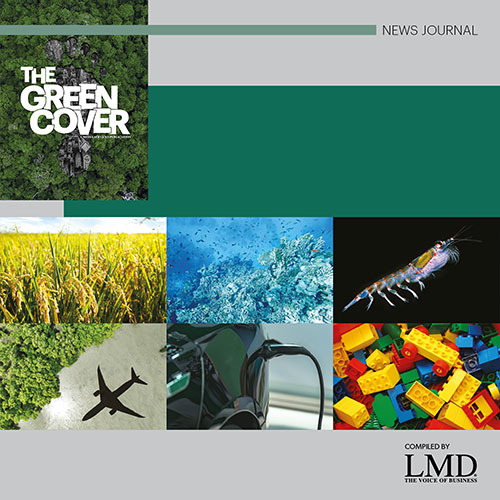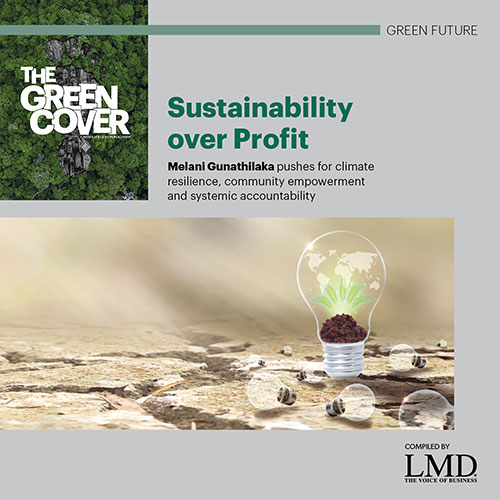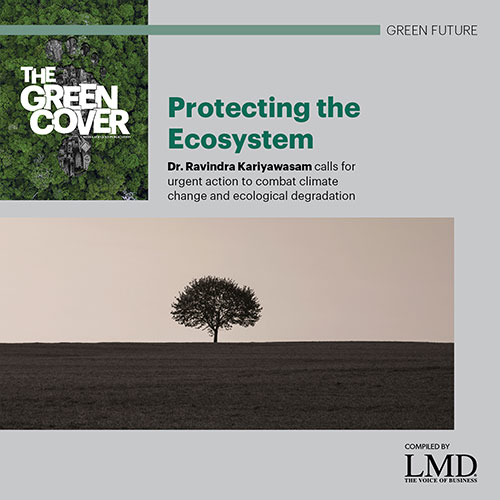CINNAMON HOTELS & RESORTS

Q: How has environmental, social and corporate governance (ESG) shaped the travel sector and tourism industry?
A: ESG is a present imperative and not a future consideration. Ignoring and disregarding it is no longer an option for travel and tourism. And ESG commitments drive responsible actions among our employees, consumers and investors. While charitable work is valuable, the challenges of today’s world demand a more comprehensive approach.
The industry must take responsibility for ESG components. This responsibility forms the safety net for the organisation. In the tourism industry, ESG is crucial for customer acquisition and retention, risk and regulation management, access to sustainable financing and investor relations.
ESG also demonstrates transparency amongst all stakeholders. The longevity of an organisation relies on the ability to understand challenges, risks and adapt accordingly.
Responding as an industry to ongoing climate crises, biodiversity loss, heightened pollution and extreme poverty is of paramount importance for sustainability, as well as for preserving natural resources and cultural heritage, which are vital for destination tourism.

Vice President – Quality Assurance, Sustainability, Health & Safety and Data Privacy
Q: How important is ESG in your organisation?
A: Embracing ESG remains essential and this is embedded in Cinnamon Hotels & Resorts’ DNA. This commitment has helped us cultivate a strong culture aligned with our vision and values.
In 2021, we set ambitious goals for 2025, and have made significant progress since. Today, we are excited to extend our vision with goals for 2030 and 2050.
While 2050 may seem distant, it requires the foresight and insight crucial at this moment. This long-term commitment reflects the corporate responsibility that Cinnamon upholds.
Our focus includes reducing greenhouse gas (GHG) emissions, enhancing water efficiency, decreasing reliance on freshwater, minimising single-use plastic and diverting waste from landfills. These efforts are vital for conserving biodiversity.
Additionally, we are dedicated to fostering partnerships and collaborations that amplify our impact, driving collective action towards a sustainable future.
Q: In which ways do you believe Sri Lanka is combatting the triple planetary crisis?
A: A report indicates that Sri Lanka’s forest cover was drastically reduced in 2023, to 11,500 hectares of natural forest. The conservation and restoration of biodiversity have always been central to our mission, and this commitment is one of our core strengths.
We work with communities, national organisations and the private sector to make lasting changes with positive impacts. And we also recognise that plastic waste is a significant concern, not only in Sri Lanka but globally. A report indicates that Sri Lanka mismanages 1.5 million tonnes of plastic waste annually.
Globally, an estimated two billion tonnes of plastic are mismanaged or discarded into the environment. This rampant pollution has far-reaching consequences. Plastic waste alters habitats and diminishes ecosystems’ ability to adapt to climate change.
It adversely affects millions of people’s livelihoods and negatively impacts food production capabilities. Therefore, addressing plastic pollution is crucial for the health of our planet and the wellbeing of its inhabitants.
As an organisation, we recognise the urgent need to eliminate single-use plastic. In 2021, we made strategic decisions and embarked on a journey to implement robust systems for quantifying our plastic usage monthly at Cinnamon Hotels & Resorts. This includes tracking how plastic is managed and disposed of.
Understanding the importance of responsible disposal, we introduced bold changes in our plastic consumption practices. Between 2021 and 2022, our single-use plastic consumption was 34 grammes for each guest night, which we successfully reduced to 13 grammes last year.
Integrating circular economy concepts is crucial; and as an industry, diverting waste from landfills is no longer sufficient. Mismanaged waste including plastic has significant implications. And we remain committed to adopting sustainable practices to ensure a healthier planet for future generations.
Much of this waste is often burned, releasing toxins into the air. When dumped into oceans or inland waterways, toxins leach into the water and soil. Additionally, micro-plastics pose a significant threat. As an industry, we must be bold in finding alternatives.
In the hospitality sector, extensive food production is a key area that needs addressing. It’s essential to scrutinise the granular details to avoid offsetting one problem while creating another.
Global indicators show that to limit warming to 1.5° Celsius above preindustrial temperatures, GHG emissions must be reduced by 45 percent, from 2010 levels, by 2030. However, this target is increasingly out of reach as temperatures have reached 1.45° Celsius in 2023.
This underscores the need for rapid resource mobilisation and decarbonising strategies to address climate change effectively. Our commitment to sustainability requires immediate and decisive action to mitigate these intensifying environmental risks.

Q: What initiatives have been taken by your organisation to protect the natural environment?
A: Our hotels are located in biodiversity rich areas, attracting guests from around the world to experience these vibrant environments. At Cinnamon, we recognise the importance of being accountable for managing these biodiverse regions.
One of our flagship conservation projects is the Cinnamon Rainforest Restoration Project, spanning 59 acres and strategically situated near the Sinharaja Forest Reserve. This initiative underscores our commitment to preserving regional biodiversity.
To effectively achieve our conservation goals, we have established key partnerships between organisations such as Ruk Rakaganno, the Forest Department Sri Lanka, John Keells Foundation and Cinnamon Hotels & Resorts. These collaborations are vital in our efforts to safeguard precious ecosystems.
The Cinnamon Rainforest Restoration Project has successfully planted 19,120 seedlings of 70 indigenous species native to the Wet Zone forest. Over a period of two years, this initiative has made significant strides with profound environmental impacts anticipated.
By 2045 it is projected to absorb approximately 600 kilogrammes of carbon dioxide annually, and generate 12 million litres of oxygen every hour. This project exemplifies our commitment to environmental sustainability and biodiversity conservation.
The site hosts a diverse ecosystem, featuring 37 species of native trees and 49 species of shrubs. The burgeoning biodiversity is further evidenced by the discovery of 36 new plant species previously undocumented during baseline surveys.
Sustained efforts in invasive species control, diligent plant care and favourable rainfall patterns have resulted in an impressive survival rate of 85 to 90 percent among planted trees. Additionally, habitat improvements have led to a significant increase in fauna species with a total of 251 recorded – an increase of 73 species attributed to these enhancements.

Q: Share how Cinnamon Hotels & Resorts is impacting communities through its initiatives and engagement activities…
A: Our community engagement activities are reaching about 6,400 individuals directly and over 30,000 indirect beneficiaries monthly. These efforts are centred on safeguarding and empowering future generations. This commitment stems from our presence in specific communities where we strive for vibrancy and prosperity.
We support Good Agricultural Practices (GAP) farmers through initiatives promoting healthy agricultural practices, benefitting 71 individuals across five locations in Sri Lanka. And during the economic crisis, our home gardening project significantly impacted over 4,000 beneficiaries, providing crucial support in challenging times.
Through ongoing evaluation and feedback, we continually enhance our initiatives to ensure they effectively meet the evolving needs of the communities we serve.
Q: What are your organisation’s plans?
A: Looking ahead to 2030 and 2050, our industry must prepare for both medium and long-term challenges. At Cinnamon, our ESG framework revolves around three core pillars – promoting the wellbeing of our planet, empowering our people and communities, and upholding good governance.
Based on the latest materiality assessment by PwC, Cinnamon gained valuable insights into critical ESG priorities. As we embark on this journey towards 2050, we acknowledge the increasing complexity of the global landscape.
Anticipating unforeseen variables that may arise, we are committed to ensuring our organisation remains agile and prepared to adapt. As an industry, we must remain agile to effectively address forthcoming challenges. Looking to 2030 and 2050, the urgency to reduce carbon emissions will only escalate due to the severe impact caused by climate change.
Moving forward, achieving net zero emissions is paramount – we need clear short and medium-term goals to pave the way to this vision by 2050. Additionally, reducing dependency on freshwater is critical as the global population growth drives increased demand.
In Sri Lanka, certain regions face water stress, highlighting the need for focused attention and innovative solutions to achieve water positivity. Our strategy must prioritise these areas, ensuring sustainable management and conservation practices to safeguard groundwater resources.

Telephone: 2306666 | Email: info@cinnamonhotels.com | Website: www.cinnamonhotels.com





